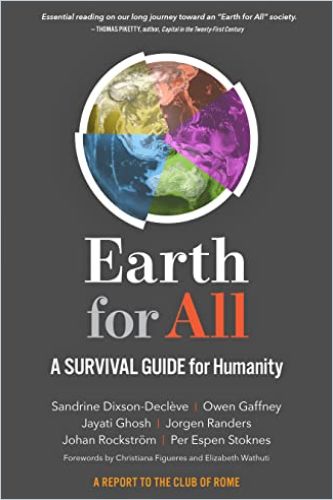The authors provide numerous, well-conceived, data-based solutions to oncoming, existential threats to human life.

Save the World
Humanity has pushed Earth to the brink of dramatic and irreversible disruption. Sandrine Dixson-Declève, Owen Gaffney, Jayati Ghosh, Jørgen Randers, Johan Rockström and Per Espen Stoknes apply sophisticated modeling and scenario-building to show how, by orchestrating major transformations, society can pull back from the precipice and move toward a healthy and sustainable future.
“Giant Leap”
The Earth for All team describe two likely scenarios: “Too Little Too Late” – business as usual; and “Giant Leap” – a global effort to boost resilience.
The alarms should be ringing…The extraordinary turnaround must start now.Sandrine Dixson-Declève, Owen Gaffney, Jayati Gosh, Jørgen Randers, Johan Rockström, Per Espen Stoknes
The authors cite significant destructive trends over the previous two decades: market privatization, deregulation and globalization; decreased government investment in society; increased corporate and financial influence; economic growth fueling increased economic disparity; and increased atmospheric greenhouse gases and social unease.
Under Giant Leap, wholesale economic, environmental and social reform begins in the 2020s. From 2020 to 2030, economic measures reduce inequality, turn the tide on climate change and improve food systems.
From 2030 to 2050, severe poverty ends. Education improves. Trust in government grows, population growth peaks, food systems promote the health of people and the planet, and greenhouse gas levels plummet.
After 2050, population and overconsumption decline. Clean energy and sustainable agriculture expand. Greenhouse gases stabilize. Governments ensure basic economic security. People eat healthily and enjoy ready access to health care.
Conversely, under the Too Little Too Late scenario, from 2020 to 2030, climate migration disrupts communities, less-developed countries develop, technology advances and voters become angry. From 2030 to 2050, economic disparities, political unrest, population and population angst increase; technology advances; atmospheric greenhouse gases decrease; climate change disrupts lives; the food system becomes unsustainable; development continues; and governance erodes.
Revamp Economic Systems
Humanity must reduce the debt poor countries hold, increase corporate taxes, curtail incentives to pollute, ease the flow of development funds and rework intellectual property law to spread beneficial technologies.
Equality sustains well-being. Leaders must apply taxes to level the economic playing field, support workers and provide basic economic support to all. Governments should strive to ensure that the bottom 40% of people earn as much as the top 10%.
Extreme levels of inequality are deeply destructive, even to the wealthy.Sandrine Dixson-Declève, Owen Gaffney, Jayati Gosh, Jørgen Randers, Johan Rockström, Per Espen Stoknes
To boost equality, governments must tax the rich more than the poor and provide a basic income for all by taxing natural resource use. Society must improve women’s access to education, opportunities to lead, financial resources and jobs. Health care and education should be available to all. A universal income will help women achieve economic independence and improve health.
The Global Food System
The current food system contributes to climate change, harms biodiversity and pollutes the planet. Humanity must change farming techniques, diets and waste less food, resources and energy.
Changing farming means halting its spread to new land, making farms carbon sinks and biodiversity refuges, attending to soil health, managing water well and producing food locally. Governments must advance “regenerative agriculture,” which keeps land healthy, and produces more food without harming the environment or using more land. People must eat more plant-based and microbe-produced foods.
Just and Sustainable
The authors are adamant that governments must redistribute wealth, alter international finance, create a more level economic playing field and invest in sustainable food and energy. People must recognize these necessary adjustments as investments, not costs.
Between 1945 and 1974, business, labor and government called the shots, shaping a relatively stable, prosperous and equitable society. From 1980 to 2008, the economy globalized and privatized as financiers took the reins. Debt and inequality grew as taxes dropped. After the 2008 crash, the divide between the wealthy and the poor expanded. Today, money begets money, creating unfairness and widespread resentment and anger.
The authors believe a viable alternative exists: prioritizing the well-being of people and “the commons” – shared resources.
Historic examples of commons include water management in Nepal and land management in England. As people divided land into ownerships, the concept of the commons shifted to government programs for education, transportation, housing and more. Knowledge became property, as private wealth controlled money and the rich exploited the commons.
The challenge now is to rebuild an economic operating system that values the commons and operates in a 21st-century context.Sandrine Dixson-Declève, Owen Gaffney, Jayati Gosh, Jørgen Randers, Johan Rockström, Per Espen Stoknes
When economies shifted from agriculture to industry, production efficiency created a product oversupply and shifted workers into service provision. Saving, investment and speculation increased. Monopolies and unearned income grew, which fed the growth of finance, insurance and real estate. Access to loans and financial security for workers declined. Financiers and the wealthy took power.
The authors argue that society doesn’t have to function this way – indeed, that is their theme. A Citizens Fund, they believe, can add nature as a source of wealth, shifting resources from finance to the people. Eliminating unjust debt elevates under-resourced countries and economic growth fuels distributed wealth. Regulation can direct private finance to public good, while public finance can boost human and planetary well-being.
Wouldn’t It Be Nice?
Dixson-Declève, Gaffney, Ghosh, Randers, Rockström and Espen Stoknes are pragmatic idealists and informed futurists. Their every proposal makes a great deal of sense and the benefits of each leap immediately to mind, often before the authors elaborate upon them. Data informs their strategies and they apply it, to a degree, realistically. And yet, sadly, any recommendation that “society” should do this or that feels automatically doomed to failure. The authors provide a workable blueprint that, unfortunately, depends on the human impulse for commonly held and commonly applied common sense. No outside force can make these worthy strategies a reality; they must come from within.









